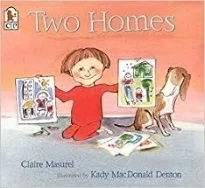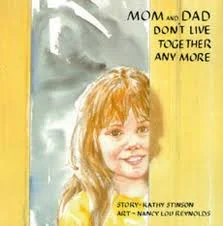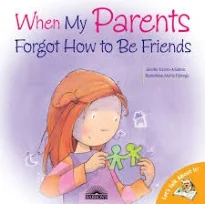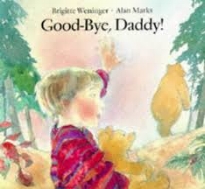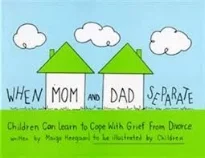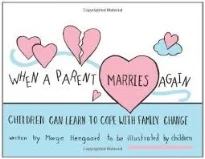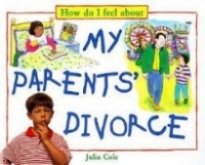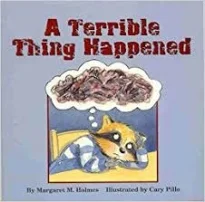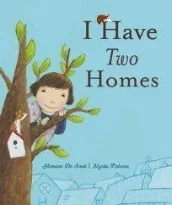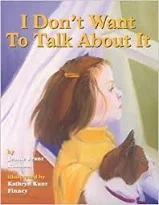
Two Homes
by Clair Masurel, illustrated by Kady MacDonald Denton (Candlewick, 2003).
Very simple, descriptive text and watercolours showing what it’s like to have two homes - different - but both full of love.
Ages 2-6
Was it the Chocolate Pudding? A Story for Little Kids About Divorce
by Sandra Levins, illustrated by Bryan Langdo (Magination Press, 2005)
This book, about a boy living with his brother and single father, explains divorce. Link in title leads you to publisher page where you can read first few pages.
Includes a Note to Parents, written by Jane Annunziata, PsyD.
Ages 3-6
Mom and Dad Don’t Live Together Anymore
by Kathy Stinson, illustrated by Nancy Lou Reynolds (Annick Press, 1984)
Re-released with illustrations by Vlan Oelofsen, 2007
Explores the feelings of a young girl whose parents have divorced.
Ages 3-6
Let’s Talk About It: Divorce
by Fred Rogers, photo illustrations (Puffin reissue ed. 2002)
Calm and caring support from Mr. Rogers as he explains divorce.
Ages 3-6
Mama and Daddy Bear’s Divorce
by Cornelia Maude Spelman, illustrated by Kathy Parkinson. (Albert Whitman & Co, 1998).
For Dinah bear and her sister Ruth some things change and others stay the same when Mama and Daddy divorce. She learns it is not her fault.
Ages 3-6
When My Parents Forgot How to be Friends (Let’s Talk About it Series)
by Jennifer Moore-Mallinos, illustrated by Marta Fabrega (Barron’s Educational Series, 2005)
Encourages children to explore their feelings and talk about them.
Ages 3-6
Good-Bye Daddy!
by Brigitte Weninger, illustrated by Alan Marks (Turtleback Books, 1997).
An upset little boy, whose father has just dropped him off after a visit, gets advice from his teddy bear who has some similar experiences to share.
Ages 3-6
It’s not your fault, Koko Bear: A read together book for parents and young children during divorce
by Vickie Lansky, illustrated by Jane Prince. (Book Peddlars, 2002).
A story for children about unisex bear Koko going through lots of feelings. Included are discussion points for parents.
Ages 3-8
Fred Stays with Me!
by Nancy Coffelt, illustrated by Tricia Tusa (Little, Brown and Co, 2007)
A young girl moves back and forth between her two homes accompanied by her best friend Fred. She is able to speak up when her parents find Fred difficult and try to change the routine. Fred is her one constant so her parents need to problem solve.
A Horn Book Honor Award Winner
The Three Questions ~ Based on a Story by Leo Tolstoy
by Jon J Muth (Scholastic, Inc. 2002)
A gentle philosophical story that points to the value of being in the present and focusing on the people you are with.
Ages 4+
The “D” Word
by Julia Cook, illustrated Phillip Rodgers (National Centre for Youth Issues, 2011)
Otis is so upset about his parents’ divorce that he can’t even say the word. Author Julia Cook suggests three “C” words – I did not “cause” it, I cannot “control” it, I must learn to “cope” with it.
Ages 4+
When Mom and Dad Separate: Children Can Learn to Cope with Grief from Divorce
by Marge Heegaard meant to be illustrated by children. (Woodland Press, 1996)
An art therapy tool for children experiencing separation and divorce. Children are encouraged to write, draw and colour. Book provides information and projects and poses questions. Meant to be shared by child and adult – therapist or parent.
Ages 4+
When a Parent Marries Again: Children Can Learn to Cope with Family Change
by Marge Heegaard meant to be illustrated by children (Woodland Press, 1996).
An art therapy tool for children. Children are encouraged to write, draw and colour. Book provides information and projects and poses questions. Meant to be shared by child and adult – therapist or parent. From Amazon: “Helps kids sort through unrealistic expectations, different values, divided loyalties, and family histories and helps reduce fear and stress surrounding marriage”.
Ages 4-8
How Do I Feel About My Parents’ Divorce
by Julia Cole (Franklin Watts Ltd., 2001)
Four friends talk about their parents’ breaking up, and give advice to other children. Illustrated with drawings, photos and cartoons. Can be read by parents and children together or kids themselves.
A Terrible Thing Happened
by Margaret M. Holmes, illustrated by Cary Pillo (Magination Press, 2000)
Something terrible happened to Sherman – something so frightening and awful that he couldn’t bear to think about it. But trying not to think about it led to all sorts of problems – nightmares, stomachaches, and angry, nervous feelings. When Sherman meets Ms. Maple and gets a chance to talk and draw about what happened he begins to feel better.
For children who have witnessed violent or traumatic events. Includes an afterword for caregivers with suggestions for how to help children in these circumstances.
Ages 4-8
I Have Two Homes
by Marian de Smet illustrated by Nynke Mare Talsma (Clavis Publishing, 2011)
Nina describes what she does and doesn’t like about having two homes.
Ages 4-8
I Don’t Want to Talk About It
by Jeanie Franz Ransom, illustrated by Kathryn Kunz Finney (Magination Press, 2000).
A little girl’s parents tell her they intend to divorce and she most certainly “doesn’t want to talk about it”! She withdraws into imagining all the animals she could be and how that would allow her to escape the situation. There is an afterword by psychologist Philip Stahl describing children’s emotional responses to divorce and how to keep communication strong.
Ages 4-8
Families are Forever! Kids Workbook for Sharing Feelings About Divorce
by Melissa Smith (Changing Lives Publications, 1999).
An interactive workbook focusing on the expression of feelings.
Ages 4-8
On the Day his Daddy Left
Eric J. Adams & Kathleen Adams, illustrated by Layne Johnson (Albert Whitman & Co. 2000)
Danny asks if it’s his fault that Daddy is moving out.
Ages 4-8
A Day with Daddy
by Nikki Grimes, illustrated by Nicole Tadgell (Scholastic Teaching Resources, 2004)
A boy lives with mum and sees dad once a week. He talks about the fun they have. An Early Reader - Reading Level 2 (grade 1). Includes notes for adults.
Ages 4-8
Rainy Day
by Emily Haughton, illustrated by Angelo Rinaldi (Lerner Publishing Group, 2004)
Boy visits with his dad after divorce. They have to change their plans because of the weather.
Ages 4-8
Bernard
by Bernard Waber. (Houghton Mifflin, 1982).
Bernard the Dog’s owners are splitting up and arguing about who will keep him. Bernard runs away.
Ages 4-8
My Mom Has a Bad Temper
by Beverly Hopkins, illustrated by Marsha Lederman. (Child & Family Press, 2001)
A child learns that her mother's anger is not her fault. Abuse and recovery with child focus.
Ages 4-8
My Mom and Dad Don't Live Together Anymore: A Drawing Book for Children of Separated or Divorced
by Judith Rubin PhD. (Magination Press, 2002)
Encourages children to express themselves through pictures. Includes a Note to Parents about the value of art therapy.
I Call My Grandparents "Mom and Dad"
by Carilyn Rouyer, illustrated by Jonathan Hagar CreateSpace Independent Publishing Platform, 2015)
Kayden is being raised by his grandparents and he is telling other children why grandchildren sometimes need to be raised by their grandparents - sometimes a parent can't take care of their own child because of issues with money, time, emotional stability, or possibly incarceration.
Break Up: Facing up to Divorce
by Gianni Padoan, illustrated by Emanuela Collini. (Child’s Play, 2002)
Ages 4-8
Do You Sing Twinkle? A Story About Remarriage and New Family
by Sandra Levins illustrated by Bryan Langdo (Magination Press, 2009).
The story is told from a young boy’s point of view, examining feelings and questions about remarriage, step parents and blended families after a divorce. He lives with his dad and visits his mum.
Includes a Note to Parents by Jane Annunziata, PsyD.
My Family is Changing: A First Look at Family Break-up
by Pat Thomas (Barron’s Educational Series, 1st ed. 1999)
A boy, a girl and their parents at various stages of family break-up. Includes questions directed at child reader.
This Is Me and My Two Families: An Awareness Scrapbook/Journal for Children Living in Stepfamilies
by Marla D. Evans (Magination Press, 1999)
Book is designed to be interactive – children complete writing, cutting and pasting activities with all the members of their old and new families. Could include Foster parents.
At Daddy’s on Saturdays
by Linda Walvoord Girard, illustrated by Judith Friedman (Albert Whitman & Co. 1987).
The story of a girl who lives with mum and sees dad on the weekend.
Dinosaurs Divorce: A Guide for Changing Families
by Laurene and Marc Brown (New York: Little Brown, 1988).
Anticipates the basic questions: why? and what will happen to me?
Ages 4-8
Talking About Divorce and Separation: A Dialogue Between Parent and Child
by Earl A Grollman, illustrated by Susanna Pitzer (Centering Corp., 2005).
A guide for parents on communicating with children about their divorce that includes a storybook for children and parents to share.
Ages 6-9
The Un-Wedding
by Babette Cole (Knopf Books for Young Readers, 1998)
Demetrius and Paula Ogglebutt have problem parents who cannot get along and need an un-wedding. Perhaps not the book one needs when looking for a guide to explain an upcoming separation/divorce, but a story told with humour that can be helpful and hopeful.
Splitting Up – What’s Happening Series
by Karen Bryant-Mole with colour photo illustrations. (Hodder Wayland, 1992)
A look at children’s good and bad experiences
Ages 6-12
Maybe Days
by Jennifer Wilgocki, MS, and Marcia Kahn Wright, PhD, illustrated by Alissa Imre Geis (Magination Press, 2001)
For children in Foster Care, addresses their feelings and questions.
Ages 4-10
